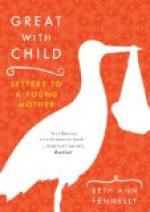This course is so simple, and so far removed from that which is generally adopted, that few mothers will probably be willing to pursue it with perseverance, especially when the teeth appear very late. Those who are, however, will be richly rewarded, in the end, in the advantages; which will accrue to the child’s health, and the vigor it will ensure to his constitution.
SEC. 8. During the process of Weaning.
It has already been shown that, in weaning, some regard should be had to the season of the year; and that the end of summer and beginning of fall are of all periods the most unfavorable. The best time, on every account, is in the spring—in March, April, May, or June; and the next best is during the months of October and November. But December, January and February are better than July, August and September.
Weaning should never be sudden. We may safely and properly call upon those who are addicted to snuff or opium taking, tobacco chewing, rum drinking, and other habits which are purely artificial, to break off—to wean themselves—suddenly; since they can do so with considerable safety, and will seldom have the courage or the perseverance to do it otherwise. But with the child, in regard to his food, such a course will not be advisable. If we regard his future health or happiness, he must be weaned gradually.
The first proper step will be to give the child a little larger quantity of the cow’s milk and gum arabic mixture, between nursings, at the same time increasing very gradually the intervals of nursing. When the intervals become six hours distant from each other, it will be best to add a little good bread to the milk with which it is fed, about two or three times a day. Arrowroot jelly, if he can be made to relish it, will be highly useful; but if not, some boiled rice, into which a little arrowroot has been sprinkled while boiling, may be added to his milk.
It may be worth the attempt to excite an aversion in the child to nursing his mother, so that be will refuse to nurse, if possible, of his own accord. This aversion may be excited by such an application of aloes, or some other offensive substance, as will cause him to withdraw himself from the breast as soon as he tastes it.
A serious mistake is often made, in connection with weaning, in giving the child not only too much food, but that which is too solid, or too rich. This mistake has undoubtedly grown out of the belief that his feeble condition requires it; whereas the truth is, that he neither needs food at this period, nor is capable of digesting it. For let us be as judicious in the process of weaning as we may, the tone of the child’s stomach will be somewhat reduced, or in other words, its powers of digestion will be weakened by it; and to give it strong food, or overload it with that which is weaker, is not only unreasonable and unphilosophical, but cruel. And if there should be a tendency in the child’s constitution to rickets, scrofula, consumption, and other wasting diseases, such a course would be likely to bring them on, and destroy life.




